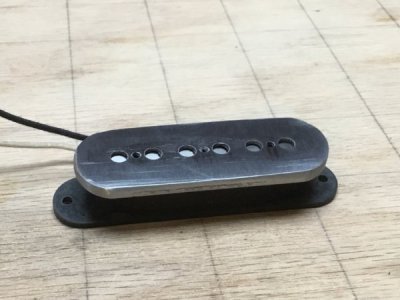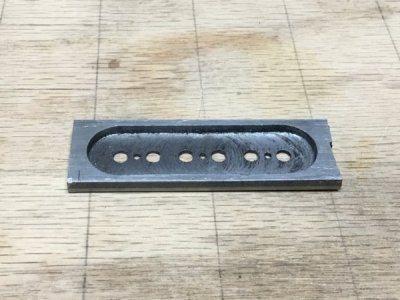-
Welcome back Guest! Did you know you can mentor other members here at H-M? If not, please check out our Relaunch of Hobby Machinist Mentoring Program!
You are using an out of date browser. It may not display this or other websites correctly.
You should upgrade or use an alternative browser.
You should upgrade or use an alternative browser.
End Mills
- Thread starter Maplehead
- Start date
- Joined
- Apr 17, 2015
- Messages
- 323
Looks like you got your slot cut. Take this as constructive feedback please; but your finish is poor. As many have said 3000 RPM seems too fast to me. When looking for speed in "mild steel" 1018 Cold Rolled as an example, use the formula CSx4 divided by diameter. CS is = to the cutting speed of the material 90 is a safe bet for Cold Rolled, diameter is the cutter diameter in a mill or diameter of the work in a lathe. So we would have 90x4= 360 divided by .75 which equals 480 RPM.
Again as many have suggested rigidity of the set up effects the cut as well. Since your using a mini mill I would suggest making sure your gibs are adjusted properly and any locks applied to axis not being used to remove movement there. Same holds true for your vise or hold downs and make sure your quill is locked as well or it will add chatter. In other words hold anything still you can.
Lastly and again credit to those who have suggested it, cutting oil can really be your friend. I also like Rapid Tap for a lot of things, its available and relatively inexpensive. It will smoke which may or not be an issue in your shop. I suspect not if your using motor oil. Cutting oil is NOT a lubricant but rather a fluid to assist in cutting the material and keeping the tool cool. Its an amazing thing, I was doing some deep boring on some chrome moly steel tubing recentlT and a few drops of Rapid tap took the chatter right out of a deep cut into a longish piece of tube.
I suspect your cutter may have been damaged early on and once that bell has been rung there is no silencing, and I'm referring to the noise it makes when you use it. I hope we have helped you here. Good luck on your next project
Again as many have suggested rigidity of the set up effects the cut as well. Since your using a mini mill I would suggest making sure your gibs are adjusted properly and any locks applied to axis not being used to remove movement there. Same holds true for your vise or hold downs and make sure your quill is locked as well or it will add chatter. In other words hold anything still you can.
Lastly and again credit to those who have suggested it, cutting oil can really be your friend. I also like Rapid Tap for a lot of things, its available and relatively inexpensive. It will smoke which may or not be an issue in your shop. I suspect not if your using motor oil. Cutting oil is NOT a lubricant but rather a fluid to assist in cutting the material and keeping the tool cool. Its an amazing thing, I was doing some deep boring on some chrome moly steel tubing recentlT and a few drops of Rapid tap took the chatter right out of a deep cut into a longish piece of tube.
I suspect your cutter may have been damaged early on and once that bell has been rung there is no silencing, and I'm referring to the noise it makes when you use it. I hope we have helped you here. Good luck on your next project
Looks like you got your slot cut. Take this as constructive feedback please; but your finish is poor. As many have said 3000 RPM seems too fast to me. When looking for speed in "mild steel" 1018 Cold Rolled as an example, use the formula CSx4 divided by diameter. CS is = to the cutting speed of the material 90 is a safe bet for Cold Rolled, diameter is the cutter diameter in a mill or diameter of the work in a lathe. So we would have 90x4= 360 divided by .75 which equals 480 RPM.
Again as many have suggested rigidity of the set up effects the cut as well. Since your using a mini mill I would suggest making sure your gibs are adjusted properly and any locks applied to axis not being used to remove movement there. Same holds true for your vise or hold downs and make sure your quill is locked as well or it will add chatter. In other words hold anything still you can.
Lastly and again credit to those who have suggested it, cutting oil can really be your friend. I also like Rapid Tap for a lot of things, its available and relatively inexpensive. It will smoke which may or not be an issue in your shop. I suspect not if your using motor oil. Cutting oil is NOT a lubricant but rather a fluid to assist in cutting the material and keeping the tool cool. Its an amazing thing, I was doing some deep boring on some chrome moly steel tubing recentlT and a few drops of Rapid tap took the chatter right out of a deep cut into a longish piece of tube.
I suspect your cutter may have been damaged early on and once that bell has been rung there is no silencing, and I'm referring to the noise it makes when you use it. I hope we have helped you here. Good luck on your next project
I don’t have the cutting fluid yetbut I did run the passes pretty slowly, about 750 to 850 RPM. The bit stayed pretty cool.
I don’t have a mini-mill. It’s a micro-mill, so even smaller lol. It took a while with all the passes but I like the results. What you see in the pic is the underside so I don’t care about the finish cut. Flipped over I am sanding to polish anyways. Thanks again.
There’s still a lot of sanding to do but here’s what I am making. The future pickups will have the slugs coming up through my metal covers.

- Joined
- Nov 18, 2012
- Messages
- 1,352
OH Wow! MH, this must have been a labour of love on a micro mill. I mill with my modified drill press set up, but yours must be more challenging and demanding of patience.
You got er done, and that is what counts.
David
You got er done, and that is what counts.
David
- Joined
- Mar 27, 2014
- Messages
- 52
I would have used a 3/8" or 1/2" and milled as a pocket ramping in or helix start using steps. Asking a bit much for a bench top mill.
- Joined
- Apr 17, 2015
- Messages
- 323
Micro mill, yea a 3/4" end mill cutting anything but plastic would be a challenge. I play a bit of electric, and acoustic for that matter, guitar, what is the advantage of a metal pickup cover? I remember the lipstick covers in the past and always thought they were for appearance only. I assume what you have there serves a musical purpose?
90% of this was done with a 1/2” end mill. I did middle passes from end to end until I got my desired depth and then I did upper and lower passes at 1/32” depths until I reached a 3/4” overall width. I then used the 3/4” end mill to complete the ends.
The metal cover is for astetics and for spreading out the magnetic field more uniformly.
The metal cover is for astetics and for spreading out the magnetic field more uniformly.
- Joined
- Feb 1, 2016
- Messages
- 4
Persistence paid off! Congratulations on what must have been a learning experience. When I started just a few years ago, it was "How hard can it be?". Wow, was I wrong. Not just the basics, but the subtleties.
Keep up the good work!
Keep up the good work!


